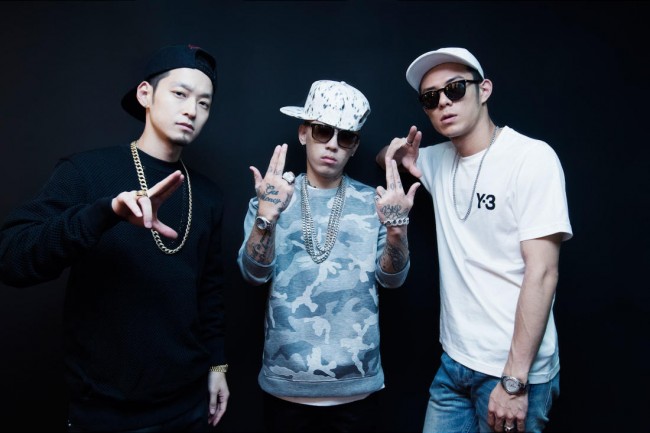EDITOR’S NOTE: The following is an excerpt from Complex Magazine’s June 30 story on Illionaire rappers Dok2, the Quiett and Beenzino. This article has been republished on KoreAm with permission.
story by JAEKI CHO
photography by BOOBA
When Korean artists tour the U.S., they usually go big—from circus lighting to pyrotechnics to branded glowsticks, no detail is left unconsidered. But last September’s show at B.B. King’s in Times Square was not your typical K-pop event.
Sure, the crowd was your usual mix of exchange students and non-Korean superfans. And yeah, the concert was sold out, with lines stretching around the block. But they weren’t paying premium prices ($115 for VIP tickets, with packages costing as much as $1,850) to watch a hyper-produced spectacle from Big Bang or 2NE1. This was a hip-hop show, featuring the trio of artists—Dok2 (pronounced doh-KEE), the Quiett and Beenzino—who make up the Korean label Illionaire Records.
Inside the venue, the opening DJ failed to get the crowd moving, and the jetlagged artists, though well-received, were performing songs that seemed largely unknown to their audience. Illionaire’s first New York City show came and went without much of a bang. But in many ways, the journey to B.B. King’s was far more important than the actual destination.
Without the aid of major-label dollars, Illionaire has risen to the top of the Korean hip-hop scene on the strength of a DIY mentality that has made the three of them rich in their home country—and, slowly but surely, on their way to achieving notoriety abroad. In doing so, they are at the forefront of a new movement in independent Korean hip-hop that is proving that there is more to the country’s musical exports than cute K-pop groups.

Of course, rap isn’t a new genre in Korea. Since the early ’90s, K-pop artists have appropriated everything from new jack swing to gangsta rap. Legendary group Seo Taiji and Boys mimicked Cypress Hill—both B-Real’s nasal delivery and DJ Muggs’ grungy production—for their ’95 hit “Come Back Home.” Later, Drunken Tiger’s more authentic form of homegrown rap helped legitimize the artform.
While borrowing from (or paying homage to) hip-hop has been a common trend in K-pop since the early ’90s, the music itself has been regarded as second class. Cultural differences are the biggest hurdle, since rap’s roots are in anti-authoritarian and ego-driven rhetoric. For Koreans who are taught the age-old proverb “A nail that sticks out gets hammered,” rap’s attitude—not to mention the alcohol and drugs—is not only deemed crude, but sometimes taboo.
However, there is also the reality that Koreans, broadly speaking, are not shy about flaunting their wealth, which falls right in line with the ethos of contemporary hip-hop. In that sense, Illionaire’s music is a sign of the material times. To start, their content is dominated by boasts about cars, jewelry, and money—especially money.
Sonically, each Illionaire artist leans heavily on popular hip-hop trends. Dok2, who has collaborated in the past with K-pop superstars G-Dragon and HyunA, prefers Southern trap and co-opts flows from Tha Carter II-era Weezy and Meek Mill; the Quiett, known more for his production, leans toward boom-bap beats like Primo; and Beenzino raps with a sing-song melody that is unmistakably inspired by Drake. The connective thread is that, to their fans, these guys are the embodiment of hip-hop cool. And Illionaire fans aren’t limited to Korea. Though their lyrics are mostly in their mother tongue, with choruses and ad-libs often in English, one needn’t understand the meaning of the words to “turn up”—a term Dok2 popularized in Korea—to Illionaire’s music.
And word to MMG, Illionaire is truly “self-made.” In South Korea, giant corporations control the entertainment industry. K-pop behemoths like SM Entertainment and YG Entertainment house the biggest idol groups, while media conglomerates like CJ E&M distribute all physical and online music for 20-plus labels, including Illionaire Records. To be successful, most aspiring rappers either join the major-label system or struggle in the underground.

But as an independent entity, Illionaire is changing the paradigm. Without the heavy-handed oversight of corporate overseers, the three Illionaire artists are selling out shows throughout Korea and topping charts, with Beenzino’s “Dali, Van, Picasso” and Dok2’s “111%” and “Multillionaire” (produced by DJ Mustard) reaching the top 10 on Korean online music charts without help from Korea’s ubiquitous music shows or radio spins. In South Korea’s tiny music market (catering to a population of just 50 million), it’s pretty much unprecedented for an indie label to hold this much mainstream clout.
Today, emboldened by Illionaire’s success, more indie Korean rappers and R&B singers are thriving without major labels, including K-pop star Jay Park and his AOMG imprint and new star Keith Ape (“It G Ma”), who was originally a product of Korean indie HI-LITE Records.
Beyond their image and sound, Illionaire earns hip-hop cred because they are hustlers who have bucked the system to create—and make money—on their own terms. Follow the leaders.
“Most South Korean rappers are from wealthy families, especially well-known hip-hop musicians,” says 30-year-old rapper-producer the Quiett. “It’s strange, considering that hip-hop was birthed in the slums.”
Korean hip-hop has its roots in Gangnam—made famous by Psy’s hit—and not an impoverished neighborhood like the South Bronx. Members of seminal Korean rap groups like Dynamic Duo and Epik High all hail from the affluent Seoul district. Being that hip-hop is a foreign culture that costs money to emulate, those with more money naturally had more access.
___
Read full story on Complex.
See Also
Producer Glen Choi’s Music Makes K-pop Fans “Go Crazy!”
Interview with Tiger JK, Korea’s Hip-hop Legend







